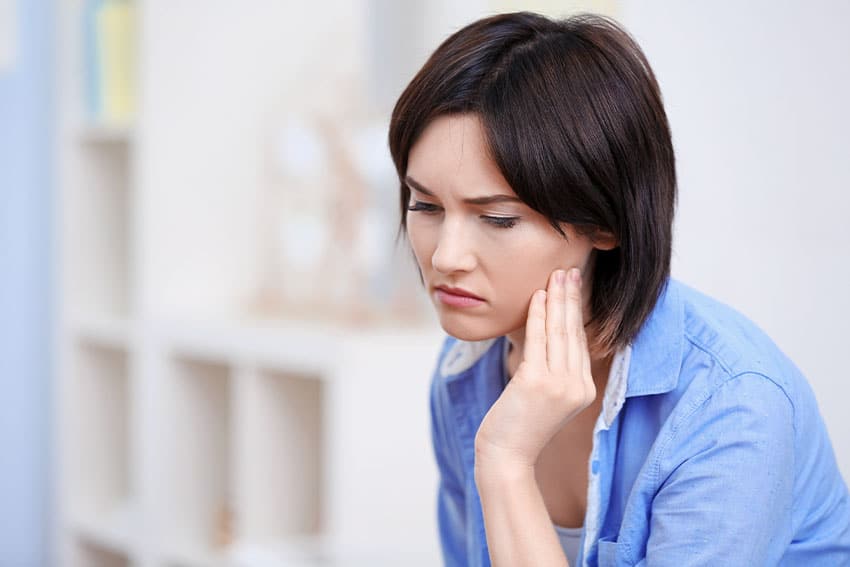Temporomandibular joint disorders (called TMJ or TMD) are common conditions. These disorders affect the temporomandibular joints, which attach the jaw to the skull. However, many people with TMJ are undiagnosed. Unfortunately, doctors get little training in recognizing the symptoms of TMJ. Most dentists know little about it, too. This means that you have to be aware of the condition and its symptoms so you can get treatment.
Here are seven common TMJ symptoms that you should watch for. If you experience multiple symptoms from this list, you should talk to a TMJ dentist about it. They will be able to help you get a proper diagnosis and treatment, if necessary.

Jaw Pain
Jaw pain is one of the most common TMJ symptoms. Although it might not be the first TMJ symptom people experience, it’s often the one that gets people’s attention.
Because the jaw is a complicated system, TMJ-related jaw pain can be complicated, too. It often comes in three types: muscle pain, joint pain, and nerve pain. Muscle pain is a dull ache associated with tense, sore muscles. Jaw muscles run from the jaw, under the face, and all the way up to the temples behind the eyes, so jaw muscle pain might be called face pain or a headache.
Jaw joint pain is a sharper, more throbbing pain localized at one or both joints. Initially, this pain may be intermittent, but over time it becomes more long-lasting, and may eventually be constant.
Nerve pain occurs when the jaw or jaw muscles pinch or press against nerves. It usually causes a sharp, electric pain. Because nerves run past the jaw to other parts of the head and face, you might actually feel pain distant from where the nerve pinching takes place. With more persistent pressure on nerves, you might instead experience tingling or numbness.
Tooth Wear and Damage
One of the features of TMJ is an unbalanced bite. Our teeth are strong, capable of withstanding the pressure of biting and chewing, when it’s divided evenly. However, when you have TMJ, you might bite down with uneven force that is damaging to some of your teeth.
Some experience more chipped or cracked teeth, which is very noticeable. Others just notice their teeth have worn down gradually, which can create a lopsided facial appearance if the wear is uneven.
Jaw Sounds
A healthy jaw should move smoothly and silently. However, if you have TMJ, you might notice significant noise coming from your jaw joints. Often, this is because the cushioning disc in the joint is slipping in and out of place. This creates a sudden, single sound, often described as a pop or click.
However, as the condition worsens, the sound may change. Instead of a simple pop or click, you might hear a long, grinding sound, called crepitus. This is the sound of the bones in the joint grinding against each other. This is also the sound that your TMJ is worsening and you should seek rapid treatment.
Irregular or Limited Jaw Motion and Locked Jaw
Many people notice that their popping or clicking jaw is associated with a sudden jerky motion in the jaw. This is the motion caused by the cushioning disc slipping into or out of place.
Other people start to note that their jaw motion is limited. They can’t open their mouths as much as they used to be able to, or, at least, not without considerable pain. This might be related to the jaw joint or it could be associated with the jaw muscles.
Finally, an individual might have their jaw lock open or closed. This often happens because the cushioning disc slips out, but can’t fit back into place. Instead, it is blocking the motion of the jaw joint. This symptom needs urgent care from a dental professional who knows how to coax the disc back in place without damaging the joint.
Headaches
Headaches are very common in people with TMJ. We’ve already talked about how jaw muscle pain can be mistaken for a headache. Many tension headaches are caused by the jaw muscles.
However, TMJ can also lead to migraine headaches. The trigeminal nerve is the source of many migraines. This complex nerve not only controls the jaw muscles and receives pain signals from them, it’s interwoven with jaw muscles. Stressed or painful jaw muscles can overwhelm the trigeminal nerve with signals, causing it to set off a migraine. Other times, jaw muscles can put pressure on branches of the trigeminal nerve, leading to migraines.
Ringing in the Ears
The ears are very close to the temporomandibular joints. In fact, the inner structures of the ear are housed in the temporal bones of the skull, which is the “temporo” in the joint name here. In addition, your jaw muscles are connected to your ear and work with tiny muscles in there. Pressure from an unbalanced jaw joint or pulling by irregular jaw muscles can potentially lead to sounds that seem to come from nowhere. This is tinnitus, or ringing in the ears, even though the sound might be throbbing, roaring, or many other types of sound.
Dizziness or Vertigo
The inner ear is also a major contributor to your balance. If your inner ear is disturbed by bone pressure or muscle tension, it can disrupt the delicate balance system. As a result, you might feel dizzy or lose your balance.
Other ear symptoms are common, too, including earache and ear fullness.
Looking for TMJ Treatment in San Diego?
Are you experiencing several of the symptoms above? If so, then it’s likely that you have TMJ. Fortunately, noninvasive TMJ treatment can offer quick, long-lasting relief from your symptoms. To get started with TMJ treatment in San Diego, please call (619) 656-6785 or use our online contact form to request an appointment at Irresistible Smiles in Chula Vista, CA.
